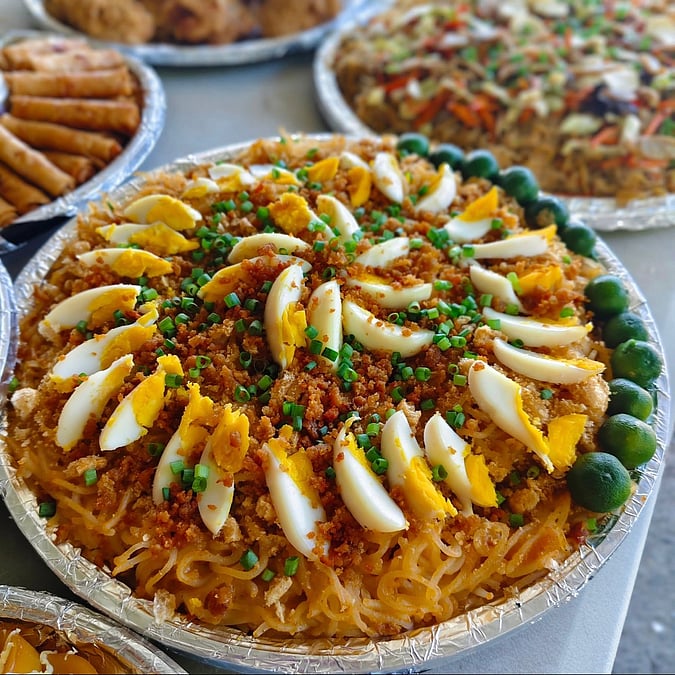Dubai: The party’s over, your belly’s full, and the karaoke’s done—but wait, there’s more… it’s Sharon time!Because at every Filipino celebration, the real finale isn’t the last song—it’s the moment your host hands you a packed container of pancit, lumpia, lechon, and rice to take home. Whether you asked for it or not, you’re going home with a second round of the feast.“Mag-Sharon ka,” they say—part joke, part tradition, all heart.Welcome to the Sharon tradition—where the love (and the food) doesn’t stop when the party ends. It’s generous, it’s hilarious, and it’s one of the most endearing customs in Filipino culture..Mic on, emotions out: Why Karaoke is the beating heart of Filipino culture in Dubai and beyond.What’s a “Sharon,” anyway?The term “Sharon” is a playful nod to iconic Filipina megastar Sharon Cuneta and her hit song “Bituing Walang Ningning” (A Star Without Shine), which famously includes the line “Balutin mo ako” (“Wrap me”). Over time, this lyrical phrase evolved into a cultural shorthand for something uniquely Filipino: a warm, food-wrapping ritual that reflects deep values of hospitality, generosity, and practicality.To “Sharon” is to lovingly pack leftovers for guests to take home—a gesture so ingrained in Filipino gatherings that it has transformed from casual habit into cherished heritage. And it’s not just a Manila thing; from Dubai to Toronto, Filipinos worldwide keep this delicious tradition alive..More than leftovers: A cultural code of careJu-Ry D. Foronda, a Filipino expat in Dubai for nearly a decade, explains it best:“For years, it has been customary for Filipino party hosts to prepare take-home containers for guests as a way of sharing their blessings—even after the celebration ends. It’s an expression of the hospitality and generosity deeply rooted in Filipino culture.”And it’s true. Filipino parties are not just events—they’re communal expressions of care. Guests are not only invited to eat like family, they’re expected to leave like family too, with food tucked lovingly under their arm..The emotional side of takeawayFood, in Filipino culture, is love. When you receive a “Sharon,” you’re not just taking home leftovers—you’re taking home a piece of the host’s gratitude and warmth.Karen Sinclair, a Filipina in HR aviation, puts it beautifully:“It’s not just about giving away leftovers, it’s really a reflection of core Filipino values. It’s their way of saying, ‘Thank you for coming, and here’s a little extra to take home.’”There’s a kind of poetic practicality to it, too. No food wasted, no fridge overcrowded, and no guest left empty-handed. Everyone wins..A practice with playful pressureBut what happens when a guest declines?According to Foronda, while it’s acceptable to say “no, thank you,” there may be some gentle social pressure to accept. It’s part of pakikisama—a value that emphasizes social harmony and going with the flow.“Refusing might be seen as rejecting the host’s generosity, so out of respect, a guest may feel inclined to accept,” says Foronda.Still, it’s mostly good-natured. Hosts give, guests receive, and everyone has a laugh when someone jokingly says, “Ay, magdala ka ng (bring) Tupperware next time!”.When guests bring their own containers…Yes, it happens. And it’s not (always) awkward.Among close friends and family, bringing your own Tupperware is often seen as resourceful—and hilarious. But in formal settings? It might raise a few eyebrows. Context is everything..Community or chaos?Most agree that the “Sharon” culture strengthens social bonds. But occasionally, there’s a fine line between generosity and opportunism—especially when guests over-pack or hoard the choicest morsels.Still, as Des Divierte, an animal advocate in Dubai, shares:“People who grew up with this norm become polite and appreciative. We don’t want to waste food—we’ve invested in creating a happy moment shared with loved ones. ‘Balutin mo ako’ gives a warm feeling to the one who organized the party. It means the food was loved, and the event was a success.”.So, next time you’re at a Filipino party… don’t be surprised if a container of adobo finds its way into your hands. Smile, say thank you, and consider yourself officially “Sharon-ed.”And if you’re wise? Bring an extra Tupperware. Just in case.Have you ever experienced the “Sharon” culture? Share your story with us—we’d love to hear how you were wrapped up in Filipino love. Or do you know another Filipino habit that might seem quirky to outsiders but is totally normal to Pinoys? Share it with us—your story might just be our next feature!.‘And the Breadwinner Is…’ on Netflix: A must-watch Filipino film that will break and heal your heart
